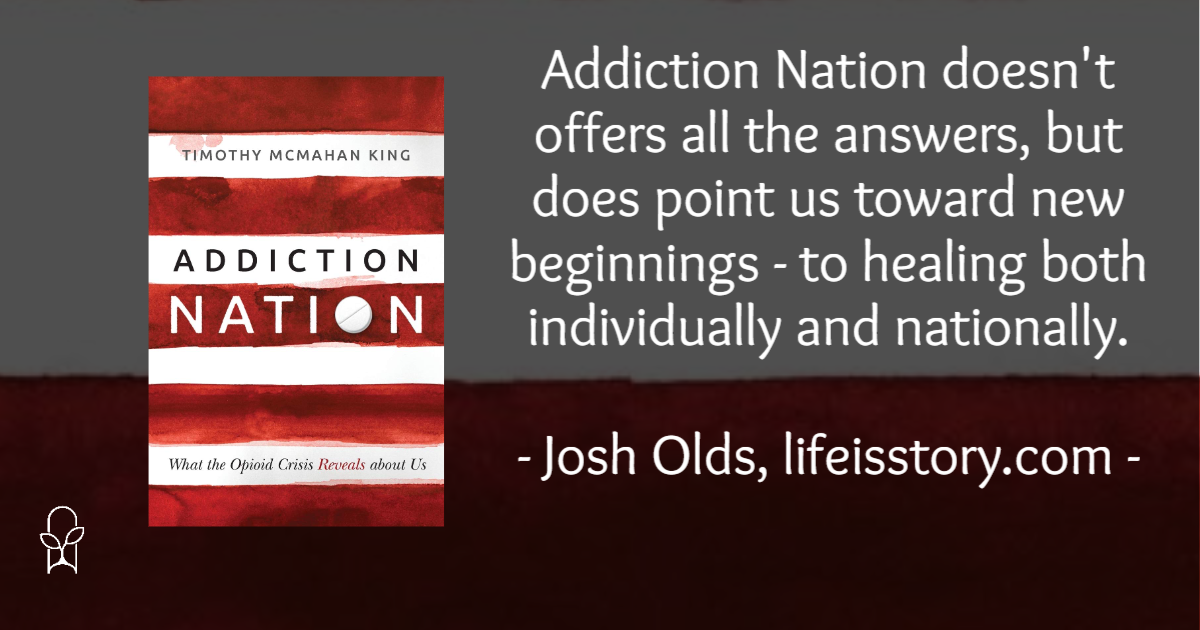
Published by Herald Press on June 11, 2019
Genres: Non-Fiction, Christian Life
Buy on Amazon
Goodreads

“Opioids claim the lives of 115 people per day. One of them could have been me.”
When a near-fatal illness led his doctors to prescribe narcotics, media consultant Timothy McMahan King ended up where millions of others have: addicted. Eventually King learned to manage pain without opioids—but not before he began asking profound questions about the spiritual and moral nature of addiction, the companies complicit in creating the opioid epidemic, and the paths toward healing and recovery.
We have become a society not only damaged by addiction but fueled by it. In Addiction Nation, King investigates the ways that addiction robs us of freedom and holds us back from being fully human. Through stories, theology, philosophy, and cultural analysis, King examines today’s most common addictions and their destructive consequences. In stark yet intimate prose, he looks not only at the rise of opioid abuse but at policy, pain, virtue, and habit. He also unpacks research showing patterns of addiction to technology, stress, and even political partisanship.
Addiction of any kind dims the image of God and corrupts who we were created to be. Addiction Nation nudges us toward healing from the ravages of addiction and draws us toward a spirituality sturdy enough to sate our deepest longings.
When I was growing up, there was this anti-drug program that advocated “Just Say No to Drugs.” Police would come into schools or churches with small amounts of various drugs, show you what they looked like, tell you horror stories, and leave. The idea was simple: scare kids and make it their fault. The program was a failure. Illegal drugs were, and are, rampant. Poverty and addiction go together. A lack of hope for a future and drug addiction go together. A lack of community resources and addiction go together. Telling kids to “just say no” while ignoring the root problems leading to drug use and then criminalizing the disease of addiction didn’t solve the problem. It made it worse.
Timothy McMahan King didn’t set out to be an addict. He wasn’t an illegal drug user. He’d never sought a high. Not until a life-threatening bout of necrotizing pancreatitis left him hospitalized and relying on a new synthetic opioid for pain management—fentanyl. Today, fentanyl is known as one of the most deadly synthetic opioids. Just the smallest amount can lead to an overdose. But at the time, King just knew that it was a doctor-prescribed medication that helped him feel better. And while the pain went away, the addiction remained.
Ten years of grappling with addiction later, King has written Addiction Nation: What the Opioid Crisis Reveals About Us. He interweaves his story alongside the history of opioids, addiction, drug use, and recovery. By intermingling the personal alongside the national—and international—King is able to show readers the devastating scale of addiction while also making it personally relatable. Statistics and numbers can tell us how bad something is, but stories make us feel and understand it.
Addiction Nation also talks about how addiction is rooted in a good thing—it’s the desire for something good gone bad, or taken to excess. King is clear that the problem isn’t just psychological, but biological. He paints recovery as something that is difficult, life-long, but worth it. He destigmatizes addiction, calls for reform in how we perceive drug users, and through his own story offers readers the hope of overcoming.
We all have been touched in some way by the specter of addiction, whether it is our own or those of friends and family. Addiction Nation asks readers to understand addiction and treat it with nuance and compassion. King’s testimony is a reminder that addiction can happen to anyone. The response of criminalization and shame from the past forty years are not working. To solve, or even just mitigate, the crisis requires a new approach. Addiction Nation doesn’t offer all the answers, but it does point us toward new beginnings—to heal both individually and nationally.
